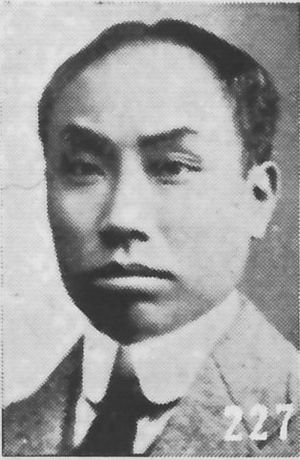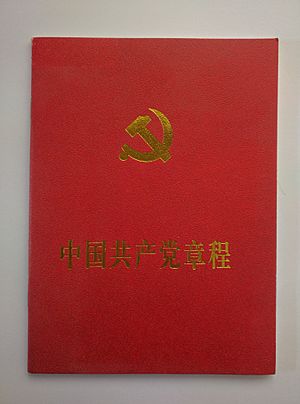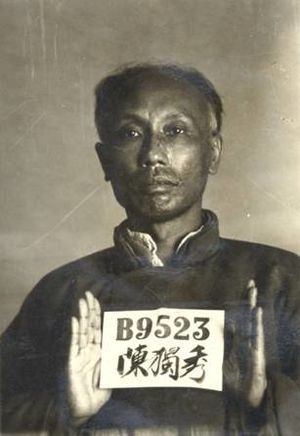Chen Duxiu facts for kids
Quick facts for kids
Chen Duxiu
|
|||||||||||||||||||||||||
|---|---|---|---|---|---|---|---|---|---|---|---|---|---|---|---|---|---|---|---|---|---|---|---|---|---|
|
陳獨秀
|
|||||||||||||||||||||||||
 |
|||||||||||||||||||||||||
| 1st General Secretary of the Central Committee of the Chinese Communist Party | |||||||||||||||||||||||||
| In office 23 July 1921 – 1 July 1928 |
|||||||||||||||||||||||||
| Preceded by | Position established | ||||||||||||||||||||||||
| Succeeded by | Xiang Zhongfa | ||||||||||||||||||||||||
| 1st Chairman of the Central Executive Committee of the Chinese Communist Party | |||||||||||||||||||||||||
| In office 23 July 1921 – 7 August 1927 |
|||||||||||||||||||||||||
| Preceded by | Position established | ||||||||||||||||||||||||
| Succeeded by | Position abolished | ||||||||||||||||||||||||
| 1st Secretary of the Central Bureau of the Chinese Communist Party | |||||||||||||||||||||||||
| In office 23 July 1921 – 7 August 1927 |
|||||||||||||||||||||||||
| Preceded by | Position established | ||||||||||||||||||||||||
| Succeeded by | Position abolished | ||||||||||||||||||||||||
| Personal details | |||||||||||||||||||||||||
| Born | 8 October 1879 Anqing, Anhui, Qing Empire |
||||||||||||||||||||||||
| Died | 27 May 1942 (aged 62) Jiangjin, Chongqing, Sichuan, Republic of China |
||||||||||||||||||||||||
| Nationality | Han Chinese | ||||||||||||||||||||||||
| Political party | Chinese Communist Party (1921–1929) | ||||||||||||||||||||||||
| Children | 7 | ||||||||||||||||||||||||
| Alma mater | Qiushi Academy (currently Zhejiang University) | ||||||||||||||||||||||||
| Chinese name | |||||||||||||||||||||||||
| Traditional Chinese | 陳獨秀 | ||||||||||||||||||||||||
| Simplified Chinese | 陈独秀 | ||||||||||||||||||||||||
|
|||||||||||||||||||||||||
| Courtesy name | |||||||||||||||||||||||||
| Chinese | 仲甫 | ||||||||||||||||||||||||
|
|||||||||||||||||||||||||
| Pen name | |||||||||||||||||||||||||
| Traditional Chinese | 三愛 | ||||||||||||||||||||||||
| Simplified Chinese | 三爱 | ||||||||||||||||||||||||
| Literal meaning | Three Loves | ||||||||||||||||||||||||
|
|||||||||||||||||||||||||
Chen Duxiu (Chinese: 陳獨秀; Wade–Giles: Ch'en Tu-hsiu; 8 October 1879 – 27 May 1942) was an important Chinese thinker, teacher, and writer. He helped start the Communist Party of China (CCP) in 1921 with Li Dazhao. From 1921 to 1927, he was the first leader of the Communist Party.
Chen was a key person in the Xinhai Revolution, which ended the Qing dynasty. He also played a big role in the May Fourth Movement. This movement pushed for new ideas like science and democracy in early China. After 1929, he was removed from the CCP and became a leader of the Trotskyist movement in China for a while. His family home was in Anqing, Anhui province. There, he started a very important magazine called New Youth.
Biography
Early Life and Education
Chen Duxiu was born on 8 October 1879 in Anqing, Anhui province, during the time of the Qing dynasty. He was the youngest of four children in a wealthy family. His father died when Chen was two, so his grandfather and older brother mostly raised him.
He received a traditional Confucian education. This type of education was needed to work for the government in Imperial China. Chen was a very good student. However, he disliked the traditional government exams. This made him want to challenge old ideas throughout his life.
Chen passed local exams in 1896 and provincial exams in 1897. He later wrote about how dirty and unfair these exams were. In 1898, he studied French, English, and shipbuilding at Qiushi Academy (now Zhejiang University). He moved to Nanjing in 1902 after speaking out against the Qing government. Later that year, he went to Japan to study at a military school. In Japan, he learned about socialism and joined Chinese groups who wanted change.
Revolutionary Activities
By the late 1800s, the Qing dynasty was weak. It had lost wars to foreign powers and faced corruption. Chen became a strong voice against both foreign control and the Qing government.
In 1903, Chen started the Anhui Patriotic Association. He also founded the Yue Fei Loyalist Society in 1905. These groups worked to overthrow the Qing dynasty. Chen was a well-known writer and leader by 1911. That year, the Wuchang Uprising began the Xinhai Revolution, which led to the end of the Qing dynasty.
In 1912, Chen became a secretary for the new military governor of Anhui. He also worked as a high school dean. He used his groups to organize students and soldiers who supported the revolution. In 1913, he fled to Japan after a brief uprising against Yuan Shikai failed. But he soon returned to China.
Founding New Youth Magazine
In 1915, Chen started a magazine called Youth in Shanghai. It was renamed New Youth in 1916. This magazine quickly became very popular among educated people in China.
New Youth criticized old Chinese traditions and Confucianism. It supported individualism and Western ideas like human rights, democracy, and science. Chen believed these ideas were important for China's future. The magazine also promoted writing in everyday language, not just old, formal styles.
In 1917, Chen became a dean at Peking University. He moved his magazine to Beijing. As a professor, he wrote that China needed to adopt Western ideas of equality and human rights. He believed that old Confucian ideas stopped this progress.
Becoming a Communist Leader
A group at Peking University, led by Li Dazhao, became interested in Marxism in 1919. Chen published a special issue of New Youth about Marxism. This issue explained Marxism in detail and was widely read. Chen was also involved in the May Fourth Movement. His ideas were seen as anti-government and central to the "New Culture Movement."
In late 1919, Chen had to leave Peking University. He was jailed for three months for giving out papers that asked for freedom of speech and assembly. After his release, Chen moved to Shanghai. There, he became more interested in Marxism and fast social change.
In 1921, Chen, Li Dazhao, and others (including Mao Zedong) started the Communist Party of China (CCP). They were inspired by the Russian Revolution of 1917. Chen was chosen as the first General Secretary of the party. He led the party until 1927 and was sometimes called "China's Lenin."
Chen worked with the Communist International (Comintern), a group based in the Soviet Union. The Comintern wanted to use the CCP to help Soviet foreign policy. This led to disagreements between Chinese and Soviet leaders. By 1922, the CCP had only about 200 members.
Working with the Kuomintang
In 1922, the Comintern told Chen and the CCP to work with Sun Yat-sen and the Kuomintang (KMT), also known as the Nationalist Party. Chen was not sure this was a good idea, but he followed the Comintern's orders. He was elected to the KMT's Central Committee in 1924.
In 1927, Chen and other Communists worked with Wang Jingwei's Nationalist government in Wuhan. They tried to bring in Communist-like policies, such as land reform. But this made some KMT generals angry, and they attacked Wang's government.
Chen had to resign as General Secretary in 1927. This was because he disagreed with the Comintern's order for Communists to give up their weapons during the Shanghai massacre of 1927. Thousands of Communists were killed in this event. He also disagreed with the Comintern's new focus on peasant uprisings.
Disagreement with Mao Zedong
Chen had disagreements with Mao Zedong starting in 1925. Mao believed that peasants should be the main focus of the revolution in China. Chen, however, thought that workers were more important. Chen also believed that business owners (bourgeoisie) should play a strong role. Mao disagreed with Chen's ideas about China's history and revolution. This led to the end of their friendship and political partnership.
In his later years, Chen criticized the dictatorship of Joseph Stalin in the Soviet Union. He believed that democratic ideas like free elections, independent courts, and a free press were very important.
Expelled from the Party
After the Communist Party and the KMT stopped working together in 1927, the Comintern blamed Chen. He was removed from all his leadership roles. In November 1929, he was kicked out of the party he helped create.
After this, Chen joined the International Left Opposition led by Leon Trotsky. Like Chen, Trotsky disagreed with many of the Comintern's policies. Chen became the main voice for Trotskyists in China. He tried to get support within the party again but did not succeed.
Later Life and Death
In 1932, Chen was arrested in Shanghai and sent to Nanjing. In 1933, he was sentenced to 15 years in prison by the Nationalist government. However, he was released in 1937 when the Second Sino-Japanese War began.
Chen was one of the few early Communist leaders who survived the difficult 1930s. But he never got back his influence in the party. For the last ten years of his life, he was not well-known. During this time, Mao Zedong became the new leader of the Communist Party. Mao's focus on peasants was seen as correct because the party survived by moving to rural areas.
After his release, Chen refused offers from the Kuomintang. He said he could not forgive Chiang Kai-shek for killing his comrades and his two sons. In August 1937, he met with CCP leaders. They said he could rejoin the party if he gave up Trotskyism and supported the fight against Japan. Chen agreed to fight Japan but would not give up Trotskyism. This was his last chance to rejoin the CCP.
Chen traveled until 1938, when he arrived in Chongqing. He took a job teaching at a junior high school. In poor health and with few friends, Chen Duxiu retired to Jiangjin, a small town near Chongqing. He died there in 1942 at age 62. He is buried in his hometown of Anqing.
Legacy
After the People's Republic of China was founded in 1949, Chen's story was used as a warning. Party members were told not to go against the party's official ideas. Later, after Mao died in 1976, Chen was still mentioned as someone who was correctly removed from power.
However, some historians have started to look at Chen's contributions differently. They believe his role in the party's history should be re-evaluated.
Literature
Writing Style
Chen believed his articles should show the problems in society. He thought that society could not improve without people pointing out its weaknesses.
Chen's articles were always very clear and strong. He often criticized corrupt Chinese officials. He was often attacked by conservatives in China and had to flee to Japan four times. He often lived in foreign areas of Shanghai to write freely.
Chen wanted his articles to get attention and start discussions. He often used strong language to highlight China's problems. In New Youth, he sometimes used fake names to create "discussions" and make people interested.
Chen also valued feedback from his readers. New Youth had forums and columns for public letters. He encouraged everyone to write, whether they agreed or disagreed. He also believed in teamwork and asked many talented writers, like Hu Shih and Lu Xun, to help him.
Journalistic Works
Anhui Suhua Bao
On 31 March 1904, Chen started Anhui Suhua Bao in Tokyo. He created this newspaper to share revolutionary ideas using simple, everyday Chinese. This made it easy for many people to read. Chen was the main editor. The newspaper's circulation grew quickly, becoming very popular. It published 23 issues before it was stopped in 1905 due to political pressure.
Chen had three main goals for Anhui Suhua Bao: to inform people in Anhui about Qing dynasty politics, to share knowledge in simple Chinese, and to promote revolutionary ideas. He believed that many Chinese cared more about family than the country. He urged them to get involved in politics.
New Youth Magazine
In 1915, Chen started The Youth Magazine in Shanghai, later renamed New Youth. It became one of the most important magazines for students in the May Fourth Movement. Chen was the chief editor. The magazine promoted using everyday language, socialism, and Marxism. It was strongly against old feudal ideas.
In 1917, Chen became a lecturer and dean at Peking University. With approval from the university's leader, he gathered writings from students he liked, including Li Dazhao and Lu Xun. New Youth moved to Beijing. It promoted science, democracy, and modern literature. It discouraged old Chinese studies. The magazine pushed for using the scientific method and logical arguments to achieve political, economic, social, and democratic goals.
New Youth focused on different things over time. From 1915 to 1918, it fought against Chinese conservatism and promoted democracy. From 1919 to 1921, it focused on socialism and Marxism. From 1921 to 1926, it shared the views of the Communist Party members.
Chen's Contribution to Chinese Journalism
Chen created a new way of writing for future journalists. He insisted on telling the truth to the Chinese people. He wanted to make Chinese media stronger. By publishing newspapers and magazines about political issues, Chen gave people a way to share their ideas or unhappiness with the government. He believed that media should always show the truth. Chen's writing helped Chinese journalism become more like that in other free societies.
Poetry
In 1918, New Youth published modern poetry written in everyday Chinese. This made it one of the first publications in China to encourage this new style of poetry. Eventually, all articles in New Youth were written in everyday Chinese. New Youth also helped popularize the use of punctuation marks in China.
Intellectual Contributions and Disputes
Views on Confucianism and Traditional Values
Chen suggested six main ideas in New Youth in an article called "Warning the Youth." This article aimed to remove old Confucian beliefs. "Warning the Youth" promoted these six values:
- Being independent instead of serving others.
- Being progressive instead of holding onto old ways.
- Being active instead of passive.
- Thinking globally instead of being isolated.
- Believing in useful ideas instead of impractical traditions.
- Using scientific knowledge instead of just intuition.
New Youth was very important in early modern Chinese history. Chen brought many new ideas to Chinese culture, such as individualism, democracy, humanism, and the scientific method. He wanted people to leave Confucianism behind and adopt Communism.
Chen believed Confucianism should be removed because:
- It made Chinese people weak and passive, unable to compete in the modern world.
- It focused on family values and ignored the importance of individuals.
- It supported unequal status among people.
- It taught extreme obedience, making people dependent.
- It demanded one way of thinking, ignoring freedom of thought and speech.
Chen called for the destruction of old traditions. His attacks gave young people new choices. New Youth was a major influence in the May Fourth Movement.
Views on Democracy and the Soviet Union
In 1940, Chen Duxiu wrote about his ideas on democracy, socialism, and the Soviet Union. He thought about the Communist movement and shared his views, rejecting some main ideas of Communism.
He believed people should learn from the Soviet Union's past without bias. He said that problems with democracy under a dictatorship should not all be blamed on Joseph Stalin.
Chen stated that democracy for workers (proletariat) is not meaningless. It includes freedoms like assembly, association, speech, publication, and the right to strike. He stressed that freedom for opposition parties is especially important. Without these, even a parliament would be useless.
He also believed that political democracy and economic socialism support each other. Democracy is not only for capitalism. If communist parties oppose democracy, then even if a "revolution of the proletariat" happens, without democracy to prevent bureaucracy, only harsh, corrupt, and dishonest governments like Stalin's would appear. He said that true socialism is impossible without democracy. He argued that "the dictatorship of the proletariat" is actually just the dictatorship of the party, and finally, the dictatorship of one leader. Any dictatorship, he said, leads to cruelty, dishonesty, and corruption.
See also
 In Spanish: Chen Duxiu para niños
In Spanish: Chen Duxiu para niños



